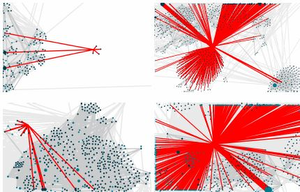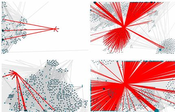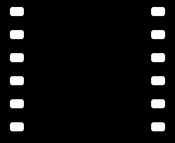Information
- Publication Type: Master Thesis
- Workgroup(s)/Project(s):
- Date: April 2020
- Date (Start): 1. April 2019
- Date (End): 30. April 2020
- TU Wien Library:
- Diploma Examination: May 2020
- Open Access: yes
- First Supervisor:
- Pages: 104
- Keywords: Node-Link Diagram, Bipartite Projection
Abstract
In this thesis, we introduce a web-based interactive exploration interface for a broadaudience to investigate large, weighted, bipartite graphs. The motivation of this workis based on theMedia Transparency Databasewhich arises from an Austrian law thatcompels legal entities to announce their advertisement spendings to media organizationsand meets the specified characteristics.Most current interactive exploration tools use complex visualizations because they weredeveloped for domain experts. As the Media Transparency Database is of potentialinterest to a broad audience, we provide a framework not just for domain experts butalso for inexperienced users.Therefore, we conducted systematic benchmarks to compare state-of-the-art web-basedrendering techniques. Furthermore, we compared the performance of different librariesto determine the most efficient rendering solution and current limitations of web-basedrendering.We introduce the concept of Firework Plots, which aims to provide a common visualizationthat scales well with the size of the data. Our visualization concept is based on intuitivenode-link visualization in combination with multiple visualization and interaction concepts.Hierarchical aggregation is used to improve scalability. Constrained, layered, force-basedgraph layouts, as well as firework animations and seamless zoom, are used to allowinexperienced users to drill down the graph hierarchy and track nodes through thehierarchy. Moreover, visibility management is used to reduce clutter and improveperformance.Based on the insights of our web-based graph rendering analysis, we implementedour framework and the concept of Firework Plots. We show the usefulness of theimplementation by discussing different use cases and comparing it to related work.Moreover, we conducted multiple benchmarks to show the rendering performance and calculation times.
Additional Files and Images
Additional images and videos
Additional files
Weblinks
BibTeX
@mastersthesis{Unger2020,
title = "Interactive Visual Exploration ofLarge Bipartite Graphs
usingFirework Plots",
author = "Katharina Unger",
year = "2020",
abstract = "In this thesis, we introduce a web-based interactive
exploration interface for a broadaudience to investigate
large, weighted, bipartite graphs. The motivation of this
workis based on theMedia Transparency Databasewhich arises
from an Austrian law thatcompels legal entities to announce
their advertisement spendings to media organizationsand
meets the specified characteristics.Most current interactive
exploration tools use complex visualizations because they
weredeveloped for domain experts. As the Media Transparency
Database is of potentialinterest to a broad audience, we
provide a framework not just for domain experts butalso for
inexperienced users.Therefore, we conducted systematic
benchmarks to compare state-of-the-art web-basedrendering
techniques. Furthermore, we compared the performance of
different librariesto determine the most efficient rendering
solution and current limitations of web-basedrendering.We
introduce the concept of Firework Plots, which aims to
provide a common visualizationthat scales well with the size
of the data. Our visualization concept is based on
intuitivenode-link visualization in combination with
multiple visualization and interaction concepts.Hierarchical
aggregation is used to improve scalability. Constrained,
layered, force-basedgraph layouts, as well as firework
animations and seamless zoom, are used to allowinexperienced
users to drill down the graph hierarchy and track nodes
through thehierarchy. Moreover, visibility management is
used to reduce clutter and improveperformance.Based on the
insights of our web-based graph rendering analysis, we
implementedour framework and the concept of Firework Plots.
We show the usefulness of theimplementation by discussing
different use cases and comparing it to related
work.Moreover, we conducted multiple benchmarks to show the
rendering performance and calculation times.",
month = apr,
pages = "104",
address = "Favoritenstrasse 9-11/E193-02, A-1040 Vienna, Austria",
school = "Research Unit of Computer Graphics, Institute of Visual
Computing and Human-Centered Technology, Faculty of
Informatics, TU Wien",
keywords = "Node-Link Diagram, Bipartite Projection",
URL = "https://www.cg.tuwien.ac.at/research/publications/2020/Unger2020/",
}

 image
image Master Thesis
Master Thesis Poster
Poster



